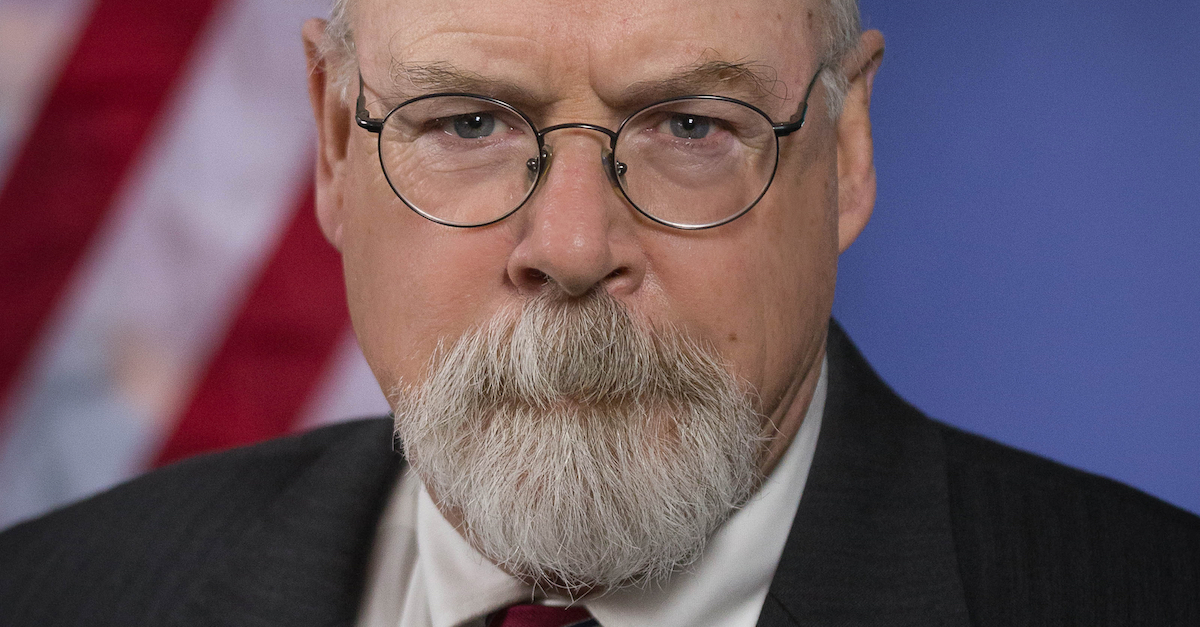
John Durham. (Government photo)
During a fateful fiscal period for his investigation, special counsel John Durham’s office billed taxpayers more than $2 million to build cases that ultimately crumbled, according to newly released disclosures.
Durham’s five-page statement of expenditures spans from April 1 to Sept. 30 of this year. The case of Hillary Clinton-affiliated lawyer Michael Sussmann ended in an embarrassing acquittal within this time frame. Another case against Steele dossier source Igor Danchenko met the same fate shortly after that.
Shortly after the release of special counsel Robert Mueller’s report into Russian interference in the 2016 presidential election, then-Attorney General Bill Barr tapped Durham to lead a separate probe looking into the origins of the former investigation.
More than three and a half years since his May 2019 appointment, Durham has brought few cases, and only one has produced a guilty plea on a charge unrelated to the Russia probe’s origins. Former FBI lawyer Kevin Clinsemith admitted to altering an email used to justify a FISA warrant for ex-Trump campaign foreign policy adviser Carter Page, who already had left that position at the time of his surveillance.
Two of Durham’s cases that went to trial this year fell apart in rapid succession. The one against Sussmann accused him of lying to the FBI about the reasons why he passed on a tip regarding a “secret communications channel” between the Trump campaign and Alfa Bank, a now-sanctioned Russian bank. Sussmann indicated that he was simply performing his duty as a good citizen, and Durham alleged that the lawyer had been secretly acting on behalf of two clients: Clinton and a tech executive subsequently identified as Rodney Joffe.
There was no allegation that Sussmann lied about that “secret communications channel,” knowingly or not.
Sussmann’s lawyers claimed that the case was an “unprecedented,” “unjust” and “unlawful” prosecution of an “innocent man,” and a federal jury ultimately found him not guilty. His defense attorneys noted that Sussmann’s connections to Clinton and the Democratic party were well known, and they called it implausible that he would risk committing a crime to mislead the FBI about information readily available to them.
That argument was bolstered by the handwritten notes of the interview with FBI agent Bill Priestap, who wrote noted Sussmann’s ties to the Clinton Foundation in his notes. Priestap also added a notation that Sussmann apparently “said” he was “not doing this for any client.”
Sussmann was acquitted in late May 2022, just a month into the fiscal year at issue.
In October, days after the fiscal period at issue ended, a separate federal jury heard Danchenko’s case, which also accused the defendant of lying to federal authorities. The judge dismissed one of the five counts before they even reached the jury. Danchenko’s attorney Stuart Sears reportedly told the jury Durham was an overzealous prosecutor who tried to convict his client “at any cost.”
At the time of Danchenko’s acquittal, Durham’s probe was known to have cost taxpayers $5.8 million for the periods between October 2020 and March 2022, the Washington Post reported. The new disclosure form, first reported by the New York Times, places the tally closer to $8 million.
Read the latest financial disclosure here.